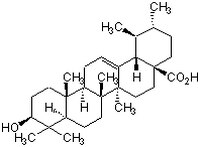672315 Sigma-AldrichUrsolic Acid - CAS 77-52-1 - Calbiochem
A cell-permeable plant-derived pentacyclic triterpene acid that displays anti-inflammatory, immunomodulatory, and antitumor activities.
More>> A cell-permeable plant-derived pentacyclic triterpene acid that displays anti-inflammatory, immunomodulatory, and antitumor activities. Less<<Synonyms: 3β-Hydroxy-urs-12-en-28-oic acid, CG7, PTPN2/TCPTP Inhibitor II, SHP2 Inhibitor IV, PTP1B Inhibitor VII, PTP Inhibitor XXVII
Recommended Products
Overview
| Replacement Information |
|---|
Key Spec Table
| CAS # | Empirical Formula |
|---|---|
| 77-52-1 | C₃₀H₄₈O₃ |
Products
| Catalogue Number | Packaging | Qty/Pack | |
|---|---|---|---|
| 672315-50MGCN | 玻璃瓶 | 50 mg |
| Product Information | |
|---|---|
| CAS number | 77-52-1 |
| Form | White powder |
| Hill Formula | C₃₀H₄₈O₃ |
| Chemical formula | C₃₀H₄₈O₃ |
| Structure formula Image | |
| Quality Level | MQ100 |
| Applications |
|---|
| Biological Information | |
|---|---|
| Purity | ≥90% by GC |
| Physicochemical Information |
|---|
| Dimensions |
|---|
| Materials Information |
|---|
| Toxicological Information |
|---|
| Safety Information according to GHS |
|---|
| Safety Information |
|---|
| Product Usage Statements |
|---|
| Packaging Information | |
|---|---|
| Packaged under inert gas | Packaged under inert gas |
| Transport Information |
|---|
| Supplemental Information |
|---|
| Specifications |
|---|
| Global Trade Item Number | |
|---|---|
| Catalogue Number | GTIN |
| 672315-50MGCN | 04055977184136 |
Documentation
Ursolic Acid - CAS 77-52-1 - Calbiochem MSDS
| Title |
|---|
Ursolic Acid - CAS 77-52-1 - Calbiochem Certificates of Analysis
| Title | Lot Number |
|---|---|
| 672315 |
References
| Reference overview |
|---|
| Li, Y., et al. 2010. Int. J. Cancer 127, 462. Pathak, A.K., et al. 2007. Mol. Cancer Res. 5, 943. Jung, S.H., et al. 2007. Biochem. J. 403, 243. Zhang, W., et al. 2006. Biochim. Biophys. Acta 1760, 1505. Shishodia, S., et al. 2003. Cancer Res. 63, 4375. |







